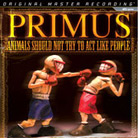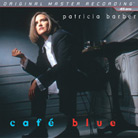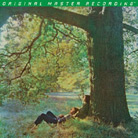![[SoundStage!]](../sslogo3.gif) The Vinyl Word The Vinyl WordBack Issue Article |
August 2005 Found On Vinyl: Primus, Patricia Barber, and John Lennon I often wonder if the imp of the perverse has been actively involved at the highest level in Mobile Fidelity’s planning, given the company's choice of titles. For every stroke of brilliance such as Folk Singer or Dark Side of the Moon there's been an oddball title such as Rush's Signals -- a fine album, mind you, but one that I'm not sure merits the reverence of the Mobile Fidelity treatment. Personally I find Mobile Fidelity's varied, quirky mix of rock, jazz and blues quite refreshing. Where other labels play it safe, reissuing pretty much only audiophile jazz and classical chestnuts, Mobile Fidelity dances around the periphery, lobbing sometimes brilliant and sometimes contrary titles into the ring. While I may not always be willing to spring for every title in MoFi's catalog, I can't help but admire the company for the choices they make and the chances they take.
ASNTTALP is a dense amalgam of white-boy funk, twisted jazz riffs and scratchy, abrasive rock, all mixed up and tortured on a whirling circus carousel. On acid. Sounds exciting, doesn't it? It sure is, Gus. ASNTTALP isn't exactly a demo-quality recording, being a studio recording of decent but not outstanding quality. Images are reasonably crisp, but as with many rock recordings, the album doesn’t capture the ambience of the space in which the recording was made. I don't think that Mobile Fidelity really intends ASNTTALP to be a piece of audiophile fluffery anyway. I'd imagine that you'd get the same cool reception with this disc at an audiophile listening party that I get at hi-fi shows when I pull out Mr. Bungle's California and promptly clear the room. Sure enough, at first ASNTTALP can be hard work to listen to actively. The angular, repetitive bass riff upon which "Carpenter and the Dainty Bride" is built tends to pull your attention away from just how busy the rest of the band is and just how funky that riff becomes as it filters down below your radar, leaving only a juicy groove. And then just when you think you've got them figured out -- surely they're just a noisy bunch of art-rockers -- they pull one out of left field with a lyrical, sparse number like "Mary the Ice Cube," which features the bass working way up in the top of its range in a manner more befitting a cello. The neat thing about this Primus EP is how much it really grew on me. There's little lyricism on it, and that makes it all the more startling when I found myself humming some of the obscure, stretched-out melodies days after I'd last listened to them. This is one album that gets under your skin, even if you'd prefer it didn't. Now back to our regular programming....
Recorded in 1994, Cafe Blue is starting to show its age, but only from the point of familiarity breeding contempt. I've listened to this album so many times that some of the more accessible cuts have begun to feel a trifle stale. That said, on each and every listen I find something that stops me in my tracks and makes me guiltily reevaluate my decision to relegate Cafe Blue to the non-current area of my record rack. Take "Nardis" for example. This instrumental track combines virtuoso drums and cymbal work with a grinding, driving bass that's laden with overtones, finger work, and fret juice. The track begins peacefully enough, but builds in that reserved Pat Barber manner until all hell breaks loose in an arms-a-flailing drum solo that rocks you backward into your seat. It's big, it's intimate, and it's intense. Mobile Fidelity has gone whole hog with Cafe Blue, recording it at 45rpm and packaging it as a boxed set of three records (one side of the third record is blank). The sound quality, as you might expect, is phenomenal. Deep, rich and edge free, Cafe Blue was a stellar recording even on standard CD, and Mobile Fidelity's 45rpm version trumps it in every respect. Perversely, the LP sounds quieter than the CD, with an inky-black background and startling dynamics, combining to present a giant-sized soundstage. The bass is exceptional -- large, deep and rich, with a more organic sound than the CD's. Great music, great sound, great packaging. What more could an audiophile ask for? I wouldn't be surprised if Mobile Fidelity decided to release a Patricia Barber boxed set in order to try and recoup some of the money they're probably going to lose on the Primus EP. Regardless, I imagine that they'll sell every one that they press. In case you don’t get a Cafe Blue, Mobile Fidelity has released other Patricia Barber albums on 45rpm vinyl.
But Plastic Ono Band isn’t all gloom and doom. Songs such as "Hold on" give some relief from the darkness, but even up-tempo tunes such as "Remember" have a feeling of darkness at their core. However, rather than leaving you depressed, Lennon manages to excavate an incredible feeling of catharsis from this stew of misery, and deep, repeated listens are repaid with musical and emotional satisfaction. Plastic Ono Band sounds fresh and polished, and holds up today. Indeed, rather than just holding up, this album is a testament to the kind of work that you rarely hear in pop these days. Each song stands on its own, but they all pull together into a work that verges on monumental. Part of the credit has to go Mobile Fidelity, which has worked wonders with this LP. In comparison to my domestic Canadian pressing, the Mobile Fidelity version almost sounds like a different work. The Mobile Fidelity LP is dead silent, with an astonishing sense of depth and solidity of image. The bass just slams out, the highs are crisp and clear, and there's none of the abrasive, gritty edge that pervades the domestic version. This album could have been recorded yesterday -- it certainly doesn't sound 35 years old. All three of these albums are pressed on vinyl that's essentially silent, exhibiting zero surface noise and not one tick or pop. As in the days of yore, these Mobile Fidelity LPs play back rather low in level. This necessitates a heavy hand on the volume knob, with the attendant increase in wow and woofer extension for the same volume. In my system at least, this isn't a problem because the records are very flat and very quiet, so even though they need to be played back at higher levels, the overall feeling is one of jet-black silence. Continuing in the Mobile Fidelity tradition, the LPs are packaged in rice-paper sleeves, which I personally prefer over any other type. The covers are glossy, beautifully printed, and reinforced with an additional cardboard sleeve. Looking back at these three unique titles it’s plain to see that Mobile Fidelity has kept up the tradition of reissuing varied and eclectic albums, and doing so in an absolutely uncompromising manner. While Cafe Blue is pretty much a no-brainer for any audiophile with a turntable, you’d be doing yourself a grave disservice if you missed out on the John Lennon album, which has withstood the test of time. The Primus title is a chancier buy. Unless you already know and enjoy the band, you’d be risking your cash on an album that would be charitably described as angular. However, I get the feeling that any true music lover would gain pleasure from, and perhaps even laugh out at, its aural hijiinx. And that’s what it’s all about -- having fun. Anyone know where I can find a Mobile Fidelity Signals? ...Jason Thorpe |
|
![[SoundStage!]](../sslogo3.gif) All Contents All ContentsCopyright © 2005 SoundStage! All Rights Reserved |
 Well, I'm happy to announce
that the Mobile Fidelity perversity has reached its luminous zenith with the 45rpm release
of Primus's Animals Should Not Try To Act Like People [Mobile Fidelity Sound Labs
MFSL 1-45001]. This is a glorious, cranky, edgy recording. Pressed on 180-gram
vinyl (all recent MoFi titles share this decrease in size from the company's 200-gram
heyday), this previously unreleased Primus EP was chosen for release by Shawn Britton,
who's a big fan of the band. Before he gave me a promo copy at CES this past January,
Shawn wanted assurance that I had seen Primus live and was therefore in on the joke.
Primus is a diabolically manic band fronted by Les Claypool, one of the most underrated
bassists alive today. With a tone reminiscent of Chris Squire and the speed and attack of
Jaco Pastorius, Claypool is an entertaining performer who can almost frighten with his
intensity.
Well, I'm happy to announce
that the Mobile Fidelity perversity has reached its luminous zenith with the 45rpm release
of Primus's Animals Should Not Try To Act Like People [Mobile Fidelity Sound Labs
MFSL 1-45001]. This is a glorious, cranky, edgy recording. Pressed on 180-gram
vinyl (all recent MoFi titles share this decrease in size from the company's 200-gram
heyday), this previously unreleased Primus EP was chosen for release by Shawn Britton,
who's a big fan of the band. Before he gave me a promo copy at CES this past January,
Shawn wanted assurance that I had seen Primus live and was therefore in on the joke.
Primus is a diabolically manic band fronted by Les Claypool, one of the most underrated
bassists alive today. With a tone reminiscent of Chris Squire and the speed and attack of
Jaco Pastorius, Claypool is an entertaining performer who can almost frighten with his
intensity.  In a startling
turn of events, Mobile Fidelity has achieved the audiophile equivalent of an armed coup by
reissuing Patricia Barber's Cafe Blue [Mobile Fidelity Sound Labs MFSL 3-45002] on
45rpm vinyl. Is there anyone out there who hasn’t heard Cafe Blue? I'm
fairly certain that pretty much every audiophile has, at one point or another, almost wet
himself in delight upon discovering this album of intelligent, beautifully performed,
cerebral jazz that was recorded with near-perfect fidelity. This album is that rarest of
jewels, combining an almost unbelievable level of musical integrity along with all of the
audiophile tricks.
In a startling
turn of events, Mobile Fidelity has achieved the audiophile equivalent of an armed coup by
reissuing Patricia Barber's Cafe Blue [Mobile Fidelity Sound Labs MFSL 3-45002] on
45rpm vinyl. Is there anyone out there who hasn’t heard Cafe Blue? I'm
fairly certain that pretty much every audiophile has, at one point or another, almost wet
himself in delight upon discovering this album of intelligent, beautifully performed,
cerebral jazz that was recorded with near-perfect fidelity. This album is that rarest of
jewels, combining an almost unbelievable level of musical integrity along with all of the
audiophile tricks.  John Lennon's Plastic
Ono Band [Mobile Fidelity Sound Labs MFSL 1-280] isn’t exactly endearing on first
listen; however, it only takes a couple of spins before you keenly understand the depth of
emotion that's at the heart of this troubled, brilliant album. Plastic Ono Band was
recorded pretty much immediately after the breakup of the Beatles, and Lennon obviously
had a serious bee in his bonnet. He gives full rein to an absolute bucketload of angst,
mixed in with just enough self-pity to add some introspection. The entire album resonates
with themes of isolation, with Lennon going to great lengths to point out, in a deeply
personal manner, how each man is an island and just how lonely and unfair the world can
be.
John Lennon's Plastic
Ono Band [Mobile Fidelity Sound Labs MFSL 1-280] isn’t exactly endearing on first
listen; however, it only takes a couple of spins before you keenly understand the depth of
emotion that's at the heart of this troubled, brilliant album. Plastic Ono Band was
recorded pretty much immediately after the breakup of the Beatles, and Lennon obviously
had a serious bee in his bonnet. He gives full rein to an absolute bucketload of angst,
mixed in with just enough self-pity to add some introspection. The entire album resonates
with themes of isolation, with Lennon going to great lengths to point out, in a deeply
personal manner, how each man is an island and just how lonely and unfair the world can
be.